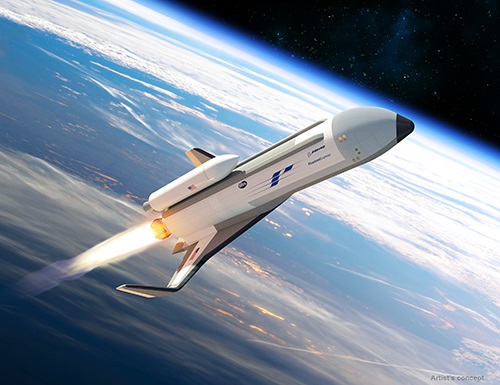
"Phantom Express" is envisioned as a highly autonomous experimental spaceplane, shown preparing to launch its expendable second stage on the top of the vehicle in this artist's concept. A Boeing image
WASHINGTON (BNS): The US Defense Advanced Research Projects Agency (DARPA) will collaborate with the Boeing Company to design, build and test a hypersonic reusable spaceplane which will deliver small satellites into low Earth orbit at affordable cost.
The new prototype vehicle, to be built under the Experimental Spaceplane (XS-1) programme, is expected to be ready by 2019 and start flight tests by 2020.
"The XS-1 would be neither a traditional airplane nor a conventional launch vehicle but rather a combination of the two, with the goal of lowering launch costs by a factor of ten and replacing today's frustratingly long wait time with launch on demand," said Jess Sponable, DARPA programme manager.
"We're very pleased with Boeing's progress on the XS-1 through Phase 1 of the programme and look forward to continuing our close collaboration in this newly funded progression to Phases 2 and 3 — fabrication and flight."
The XS-1 Phase 2 includes design, construction, and testing of the technology demonstration vehicle through 2019. It calls for initially firing the vehicle's engine on the ground 10 times in 10 days to demonstrate propulsion readiness for flight tests.
The Phase 3 objectives include 12 to 15 flight tests, currently scheduled for 2020, DARPA said.
After multiple shakedown flights to reduce risk, the XS-1 would aim to fly 10 times over 10 consecutive days, at first without payloads and at speeds as fast as Mach 5. Subsequent flights are planned to fly as fast as Mach 10, and deliver a demonstration payload between 900 pounds and 3,000 pounds into low Earth orbit, the research agency further added.
Boeing will develop the autonomous, reusable spaceplane capable of carrying and deploying a small expendable upper stage to launch small ((3,000 pound/ 1,361 kg) satellites into low Earth orbit.
Once the spaceplane – called "Phantom Express" – reaches the edge of space, it would deploy the second stage and return to Earth. It would then land on a runway to be prepared for its next flight by applying operation and maintenance principles similar to modern aircraft, Boeing said.
Both DARPA and Boeing will invest funds in developing the new spacecraft.
The DARPA-Boeing venture joins a race among other American privately-run space firms to build a new generation of reusable space vehicles to lower the cost of putting satellites in orbit.
A major contender in the race includes Elon Musk's SpaceX which is progressively working on its Falcon 9 reusable rocket and the Dragon spacecraft.
 Previous Article
Previous Article Next Article
Next Article












The Indian Air Force, in its flight trials evaluation report submitted before the Defence Ministry l..
view articleAn insight into the Medium Multi-Role Combat Aircraft competition...
view articleSky enthusiasts can now spot the International Space Station (ISS) commanded by Indian-American astr..
view article